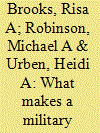|
|
|
Sort Order |
|
|
|
Items / Page
|
|
|
|
|
|
|
| Srl | Item |
| 1 |
ID:
135992


|
|
|
|
|
| Summary/Abstract |
In February 2008, the Department of Defense (DoD) reissued DoD Directive 1344.10, ‘‘Political Activities by Members of the Armed Forces on Active Duty,’’ a standing list of political behavior do’s and don’ts for members of the active duty military. Three months later, the then-Chairman of the Joint Chiefs of Staff, Admiral Michael G. Mullen, took the extraordinary step of writing an open letter to members of the armed forces in Joint Force Quarterly, warning them to keep their politics private, remarking that ‘‘the only things we should be wearing on our sleeves are our military insignia.’’1 Four years later, his successor followed suit. In reminding the military of the need to remain nonpartisan during an election year, General Martin E. Dempsey cautioned, ‘‘The lines between the professional, personal—and virtual—are blurring. Now more than ever, we have to be exceptionally thoughtful about what we say and how we say it.’’2 These measures, taken just months before presidential elections, are indicative of the military’s concerns about politicization within the ranks and the very specific concern that members of the military are crossing the traditional and sacred line of political neutrality during election campaigns
|
|
|
|
|
|
|
|
|
|
|
|
|
|
|
|
| 2 |
ID:
187105


|
|
|
|
|
| Summary/Abstract |
Scholars have contended that norms of professionalism are critical to understanding how militaries interact with civilian leaders and when they intervene in politics. Yet, few studies have directly examined the normative structures of military officers. Through a survey of 1468 US Military Academy cadets, this study evaluates cadets’ views toward professionalism, and in particular what is often presumed to be the dominant framework of those norms based on Samuel Huntington’s The Soldier and the State. We identify five patterns of normative beliefs based on cadets’ views of civil–military interaction and the nonpartisan ethic: orthodox, unorthodox, inconsistent, non-committal, and motivated norms. Cadets fall into each of these categories, but approximately one-quarter demonstrate motivated norms, adhering when convenient, and otherwise dispensing with them when the rules they prescribe clash with their partisan identities. These findings, especially our novel conceptualization on norm adherence, contribute to a greater understanding of military culture and professionalism.
|
|
|
|
|
|
|
|
|
|
|
|
|
|
|
|
|
|
|
|
|